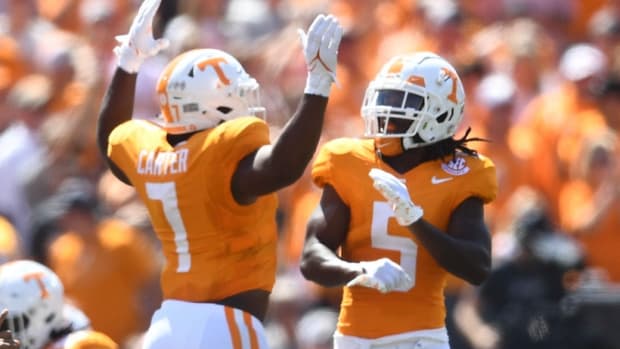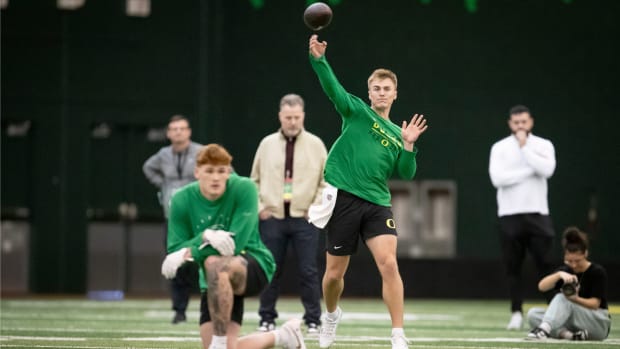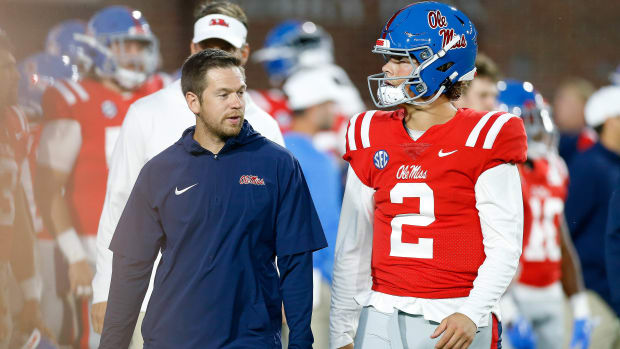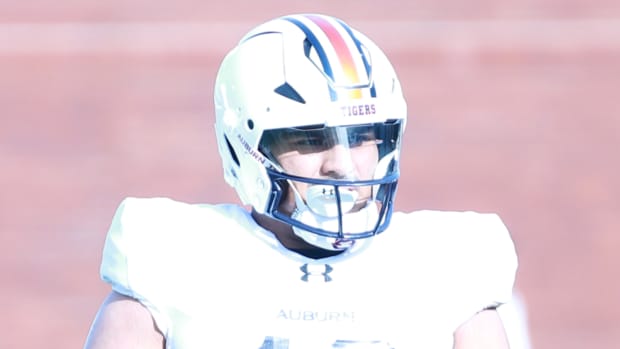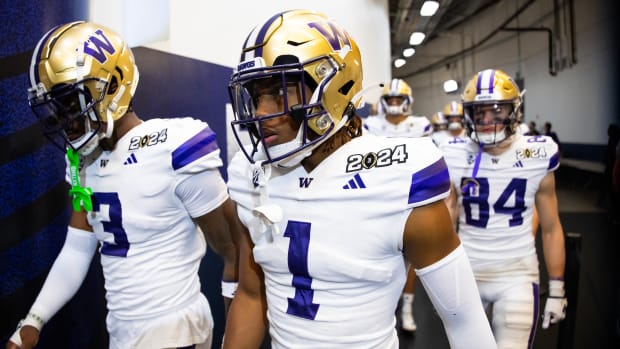Breaking Down Kolby Listenbee's Lawsuit Against TCU, Gary Patterson and the Big 12
The legal consequences of football players feeling pressured to “play hurt” and “man up” has been a central theme in the concussion litigation.
But injuries to the brain are not the only kinds of serious ailments suffered by football players. What about the legal consequences of players feeling pressured to play through painful back, pelvis and leg injuries?
We may soon find out.
On Wednesday, former Texas Christian University wide receiver Kolby Listenbee filed a personal injury lawsuit in Dallas County Court against the Big 12 Conference, TCU, head football coach Gary Patterson, athletic director Chris Del Conte and a group of assistant TCU coaches, physicians and trainers. Listenbee—who recently signed a reserve/future contract with the Indianapolis Colts—argues that TCU and its staff were “malicious” and “grossly negligent” in how they responded to him suffering a debilitating pelvic region injury.
Listenbee’s painful touchdown
During the third quarter of TCU’s game against Southern Methodist University on Sept. 19, 2015, Listenbee tracked down a 31-yard pass from quarterback Trevone Boykin in the end zone to score a touchdown. The catch expanded the Horned Frogs’ lead over the Mustangs to 34 to 17.
Unfortunately for Listenbee, he landed awkwardly while making the catch. After he stood up, he walked away with a limp. He also gestured in pain to the lower part of his back and pelvis region. Then, as Listenbee neared the sideline, he would collapse to the ground. Listenbee’s teammates rushed over to carry him off to the athletic trainers’ table.
The NCAA's Own History in MSU's Sexual Assault Scandal Could Impede Any Potential Punishment
An MRI would show that Listenbee suffered osteitis pubis with marrow edema and possible grade 1 strain of his obturator muscles bilaterally. This injury meant that Listenbee was experiencing serious inflammation in the pubic symphysis (which refers to the cartilage uniting the two pubic bones) and surrounding muscles. According to Listenbee’s attorney, Derek Potts, the standard of care for treating an athlete with such an injury is eight to 12 weeks of rest. The NCAA’s Sports Medicine Handbook also discourages extensive use of corticosteroids and numbing agents. The concern with “masquerading” this injury and many other injuries through numbing agents is that it can lead to atrophy in the surrounding tissues.
Listenbee’s recovery—or lack there-of
Listenbee wouldn’t get 12 weeks of rest or even eight weeks of rest. Instead, Listenbee says, he was “forced” to practice almost immediately.
Listenbee claims that in spite of repeatedly telling team doctors and his coaches that he was experiencing terrible discomfort, they not only cleared him to play but they warned him that unless he suited up his roster spot would be jeopardized.
Listenbee played again for TCU only a few weeks after his injury. He suited up for TCU in its game against Kansas State University on Oct. 10. The game was a disaster for Listenbee, who recalls experiencing massive pain and limited mobility. Listenbee failed to record a catch in the game.
Listenbee continued to struggle with throbbing pain for the remainder of his senior season. His coaches and trainers nonetheless expected him to play, Listenbee asserts. He also says team medical staff would frequently administer injections of local anesthetics and corticosteroids—both before games and during halftime—to numb the pain. Given that pain is the brain’s way of telling us to stop using a particular part of our body, painkillers can lead an athlete to underestimate the short- and long-term danger of playing hurt.
Listenbee finished his senior season with 30 catches for 597 yards in 10 games, statistics that roughly approximated those from his junior year when he caught 41 catches for 753 yards in 13 games. Listenbee had been expected to take a big leap in his senior year and dominate for the Horned Frogs. That did not happen.
The alleged shaming and bullying of Listenbee to play
Listenbee’s complaint details how the pressure to play hurt surfaced only minutes after the injury. Listenbee claims that Patterson instructed him “to get back out on the field.” Patterson, Listenbee insists, also became “visibly upset” when Listenbee said he couldn’t get back on the field. Listenbee recalls telling Patterson and the other coaches, “he was barely able to walk.” They didn’t care, Listenbee maintains.
In the weeks that followed the SMU game, Listenbee remembers how the coaching staff “continually harassed, humiliated, pressured, and threatened [him] to return to play.” They would also, Listenbee says, repeatedly mock his injury as imaginary or exaggerated. Indeed, Listenbee recalls how his coaches told his teammates that he was “faking it” because he was “soft.” As told through Listenbee’s account, the coaches also liked to compare a sidelined Listenbee to injured teammates who were brave enough to be “playing through” their pain. The coaches, according Listenbee, also demeaned him by switching his seat during team meetings with the seat reserved for the third-string quarterback.
The coaches’ alleged ridicule and scorn soon became outright threats, Listenbee recalls. In his complaint, Listenbee asserts that Patterson warned Listenbee he would be dismissed from both the team and school if he didn’t suit up for the Horned Frogs’ Oct. 3, 2015 game against the University of Texas. Listenbee also remembers Patterson and other coaches threatening to badmouth him to NFL scouts as “not tough enough” to play NFL football. In order words, Listenbee claims his own college coaches conspired to see him fall in the draft or not be drafted altogether—all as a punishment for not suiting up.
Facing these pressures, Listenbee (who was 21 years old at the time) reluctantly agreed to return before he was healed. He regrets doing so since his injury would not heal properly and the frequent use of corticosteroids may have deteriorated cartilage, muscles, and the entire infrastructure of his pelvis.
If the NCAA Tweaked Its Transfer Rules, Would a Recruiting Rules Tweak Follow?
Listenbee’s injury doesn’t stop him from impressing NFL scouts
Despite an injury-laden senior year, Listenbee regained the confidence of NFL scouts during the Feb. 2016 NFL Combine in Indianapolis. He recorded the second fastest time—4.39 seconds—among all wide receivers who participated in the 40-yard dash. At that time, it did not appear that Listenbee’s osteitis pubis injury had slowed him down.
A month later, however, Listenbee’s health came into question once again. He underwent surgery to repair two sports hernias that he says developed “due to the injections administered to him after his Sept. 19, 2015 injury.” Undeterred by Listenbee’s uncertain health, the Buffalo Bills drafted him in the sixth round of the 2016 NFL draft.
The Bills’ gamble didn’t pay off. Listenbee was not healthy enough to play during training camp. His recovery from double sports hernia surgery had been slowed by inflammation in his pelvic region. In August 2016, the Bills placed Listenbee on the Reserve/Non-Football Injury list. He would not play again that season.
Listenbee’s health took a turn for the worse in December 2016 when he underwent surgery. A metal place was inserted to fuse his pelvic bones together. The Bills would cut Listenbee in June 2017. He signed a practice squad deal with the Miami Dolphins in October 2017 but would be cut by the team a couple of months later. On Jan. 1, 2018 Listenbee signed a reserve/futures contract with the Colts. Such a contract is non-guaranteed. The odds of a player who signs reserve/futures contract making the regular season roster are, to be generous, not high.
Still only 24 years old, Listenbee has yet to play a down in the NFL.
Understanding Listenbee’s lawsuit and TCU’s likely defenses
Listenbee contends the Big 12, TCU and TCU employees acted negligently in a variety of ways. More specifically, he insists the defendants acted unreasonably in regards to:
- Clearing him to play before he was healed from the injury;
- Pressuring him to play while he was hurt;
- Treating his injury with an overuse of painkillers;
- Lacking any sensible or transparent set of rules and policies for dealing with a player who suffers a serious injury to his body;
- Fraudulently assuring Listenbee that “TCU’s football program had the nation’s best medical personnel.”
- Negligently hiring, and negligently supervising, coaches and staff who were entrusted with safeguarding the health of college students;
- Failing to inform Listenbee of the long-term implications of playing hurt and how it could ruin his chances for an NFL career
Listenbee contends that as a result of the defendants actions and omissions, he suffered “past and future damages, including, past and future medical expenses, past and future lost wages and/or loss of earning capacity, past and future pain and suffering past and future mental anguish, past and future physical disfigurement, past and future physical impairment, and past and future aggravation of Preexisting condition.” He further contends that he has endured “losses in value and losses in profits, including, but not limited to NFL career earnings, track & field earnings and endorsement earnings.”
Anticipating the Big 12 and TCU’s likely defenses
In the coming weeks, the Big 12, TCU and the other co-defendants will answer Listenbee’s complaint. They will almost certainly deny his allegations and raise an assortment of defenses.
To that end, expect the defendants to argue that much of what Listenbee says happened two and half years ago didn’t actually happen.
Listenbee recalls a number of inflammatory statements that he attributes to specific people, most especially Patterson. It is unclear if Listenbee has evidence corroborating that these statements occurred. For instance, are there any recordings of what Patterson allegedly threatened in his interactions with Listenbee? Did Listenbee memorialize Patterson’s threats, such as through a handwritten journal or through emails and texts to his family or friends? Will witnesses, such as former teammates, back-up Listenbee that these remarks were actually made?
Along those lines, Listenbee’s complaint details the chain of events as he recalls them and in a light most favorable to his case. TCU and Patterson, in particular, will offer additional facts that attempt to refute or at least downplay assertions offered by Listenbee. Expect the defendants to argue that Listenbee’s health was of paramount concern and that they would never knowingly place a player in a position that could cause him further harm or that would interfere with his recovery. They might say Listenbee wasn’t clear about his injury and his recovery. Perhaps they have emails or texts from Listenbee that cast him in a different light than how he is portrayed in his own complaint.
USC Should Be National Signing Day's Most Interesting Team
The defendants might also argue that to the extent Listenbee felt pressured to play, that pressure came from within. Football players are among the toughest athletes around. Of course, such a narrative could backfire for the defendants: one of their jobs was to not let Listenbee, or any injured college student on the team, play hurt merely because he wanted to.
With the fear of having to pay monetary damages in mind, the defendants might also highlight that Listenbee’s health didn’t stop him from excelling at the scouting combine and didn’t dissuade an NFL team from drafting him over many other wide receivers. And while injuries have clearly interfered with Listenbee’s NFL career, the Colts thought as recently as month ago he was healthy enough to sign.
TCU certainly has reason to aggressively defend itself. The school knows that the NCAA could investigate Listenbee’s assertions. In light of the Larry Nassar scandal at Michigan State, the NCAA might be especially sensitive to claims that a member school failed to protect its student athletes from abusive university employees. Further, the NCAA has textual support to punish a school in this type of scenario Both 2.2 of the NCAA constitution and bylaw 20.9.1.6 make clear that a core duty of the athletic department is to protect student-athletes.
As a final point, it’s possible that the several of the defendants could explore the possibility of counter-suing Listenbee.
Take Patterson, who is the winningest coach in TCU football history. At a minimum, Listenbee’s depiction of Patterson is one of something of a tyrant who makes his injured players fear retribution or retaliation if they don’t play hurt. This kind of characterization could damage Patterson’s standing with university leadership and trustees. It could also frustrate Patterson’s ability to recruit elite players and thus damage the program. It is not inconceivable, then, that Patterson could consider the possibility of counter-suing Listenbee for defamation. Working against Patterson, however, is that statements made in the course of litigation are normally privileged from defamation claims.
SI.com will keep you updated on Listenbee’s lawsuit and how the Big 12, TCU and Patterson respond.
Michael McCann is SI’s legal analyst. He is also an attorney and the Associate Dean for Academic Affairs at the University of New Hampshire School of Law, and co-author with Ed O'Bannon of the forthcoming book Court Justice: The Inside Story of My Battle Against the NCAA
